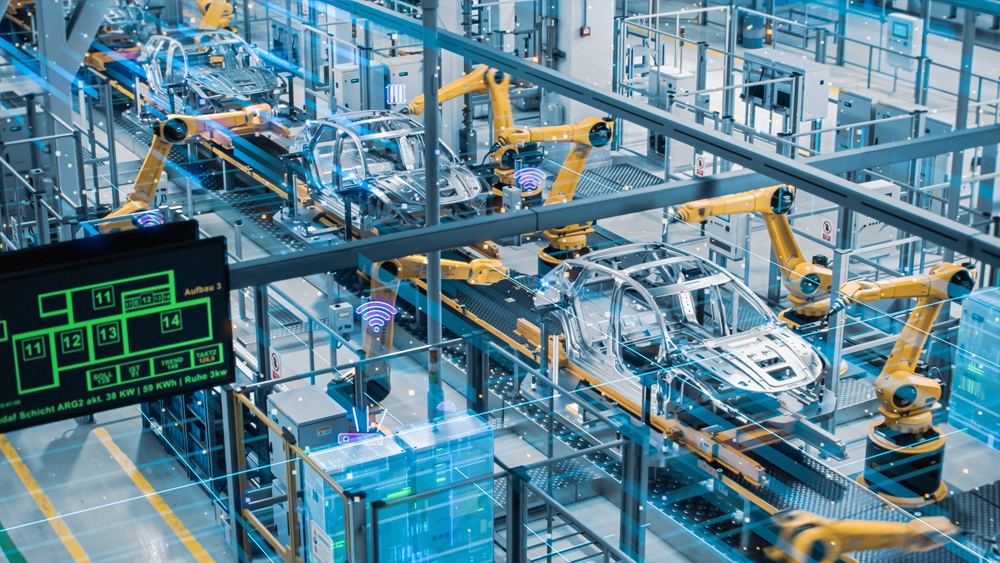Coping with Market Disruptions

As manufacturers deal with several challenges along their value chain, digitally enabled plants can help manage the crisis and even scale up for the future.
While the sector was already disrupted before the COVID-19 outbreak, recent events have further exposed structural weaknesses. Supply chains have been interrupted and have had to be redesigned. A volatile demand landscape has hit production cycles and disrupted inventory allocation. Add in labor shortages, an uncertain global economic recovery, and increasing regulatory emphasis on sustainability, and manufacturers are faced with a seemingly endless concern about every aspect of their businesses.
In a McKinsey global survey, 94 percent of respondents said Industry 4.0 tools helped keep operations running throughout the recent disruption. The experience of joint AVEVA and Microsoft customers shows how digital transformation can sustain and scale operations going forward in order to create profitable and sustainable business outcomes.
Companies can address labor challenges by replacing repetitive tasks with more automation, both physical and digital. Real-time, cloud-based remote access to plants and factories can improve decision-making and enhance collaboration for greater efficiency. Artificial intelligence can bridge knowledge gaps while optimizing production and sustainability.
In short, when a plant is digitally transformed, it is better equipped to deal with market disruptions outside the facility’s four walls, whether these are demand-related or supply-related.

Smart factory, sustainable results
In Batam, Indonesia, a Schneider Electric factory used digital solutions to leverage innovation across the value chain with quantifiable and sustainable results. The facility produces 11 lines of Schneider Electric products.
Although operations were functioning well enough with an existing Internet of Things-enabled solution, factory management identified several other challenges. Besides equipment downtime and siloed data, a lack of visibility on shopfloor activity resulted in a delayed response to issues on the line.
From smart factory initiatives to e-commerce transformation, digital initiatives can support resilience, maintain momentum, and enhance sustainability. With the right digital toolkit, manufacturers can build a sustainable and competitive future.
Schneider Electric executives felt the answer lay in digital transformation. Smart factory solutions helped boost collaboration and unify data across the plant to manage and predict equipment failures while optimizing performance and reducing downtime.
Industry 4.0 at work
To improve asset performance management, Schneider Electric installed a cloud-based solution focused on increasing plant asset utilization and operational performance by providing accurate information on potential equipment outages. Additionally, lean management software was deployed to streamline discrete manufacturing. Together, the solutions monitor assets to identify, diagnose, and prioritize impending equipment problems, continuously and in real time.
The digital manufacturing solutions helped streamline order flow and production execution, tracking the transformation of products from raw materials to finished goods while evaluating and analyzing yield, quality, and plant resource utilization.
Early business benefits in Batam included a safer and more efficient factory, optimized asset and process efficiency, and secure, reliable operations. Within a short time of the implementation, Maintenance 4.0 had helped the Batam Smart Factory reduce downtime by 44 percent over 12 months. Digital performance management tools led to 12 percent higher operational efficiency and 5 percent higher employee engagement. Quality 4.0 for defect reduction led to a 40 percent reduction in scrap costs for some critical machines, while an integrated supply chain increased suppliers’ service rates by 70 percent. As a result of the entire program, on-time delivery improved by 40 percent.
Most important for the team was how Industry 4.0 capabilities connected the shopfloor to the top floor. Because performance is now tracked in real time, something that was impossible previously, business heads can quickly make responsive, data-driven decisions in line with immediate market pressures. Across the value chain, improved resiliency strengthens trust, and enhanced efficiency reduces the plant’s carbon footprint.
Digital lessons shared globally
The Batam facility now offers global manufacturers a template for best-in-class digital manufacturing; it was recognized as a Fourth Industrial Revolution (4IR) Lighthouse by the World Economic Forum. Schneider Electric has since extended knowledge gains from Batam across its worldwide network.
Like Schneider Electric, other early digital adopters in the Manufacturing sector fared better during the pandemic. From smart factory initiatives to e-commerce transformation, digital initiatives can support resilience, maintain momentum, and enhance sustainability. With the right digital toolkit, manufacturers can build a sustainable and competitive future.

KIM CUSTEAU
Executive Vice President
Portfolio
AVEVA




 Facebook
Facebook.png) Twitter
Twitter Linkedin
Linkedin Subscribe
Subscribe